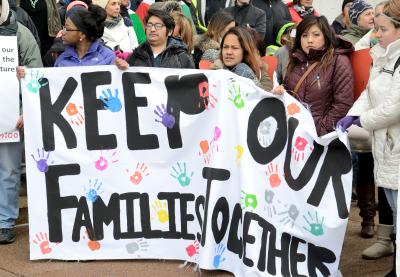Mandy Manning is the 2018 National Teacher of the Year and the lead organizer of Teachers Against Child Detention (TACD), an alliance between educators and immigrant rights advocates. TACD is calling upon educators to demand that the U.S. government end the detention and criminalization of immigrant children and their families.
Guided by the belief that all children deserve to be free and in school, the alliance is inviting educators across the country to becomes advocates for immigrant children.
Manning spoke to Teaching Tolerance Teaching and Learning Specialist Stef Bernal-Martinez about why she hopes a critical mass of teachers will choose to participate in one of two ways: 1) attending the Teach-In for Freedom, scheduled for February 17 in El Paso, Texas; or 2) responding to the Call to Action by teaching a lesson in their classroom, hosting a book and letter drive in their school and making a video of support. (See this article for more information and to see sample learning plans designed for the Call to Action.)
One piece of the Teachers Against Child Detention’s Call to Action is for teachers to educate their community. What is the internal work of educators who will be taking on this Call to Action?
Everything starts with self-reflection—the recognition of where you come from and what impacts how you perceive the world. You must recognize that other people have different experiences from you.
And when working with students, ask simple reflection questions. In my lesson with my son’s class, we started with, “What makes you feel safe in your life?” and the students said, "when my parents are with me," "when I have food and water” or “when I have warm clothes." The connections became clear.
We all have to make personal connections.
When we’re welcoming new immigrants, or new community members, into the places we live, it’s an exchange. It’s not a favor. Sometimes, we fail to recognize that new community members offer us new perspectives, new experiences and new ideas. When we make personal connections, the work then becomes about sharing, about community and about recognizing that we all have things we need and things we need to give.
How are you and Teachers Against Child Detention connecting with organizers on the ground and folks who are directly impacted?
I have noticed that directly impacted communities will throw themselves wholeheartedly into this sort of action. It’s really important to Teachers Against Child Detention to work with those directly impacted communities because they have a vested interest. We need to honor everything they’ve already done and recognize that we are an add-on. We are another willing voice and we need to take direction from those who are veterans in this work.
Also, I think that it’s an important thing to note that we’re all impacted. Teachers Against Child Detention is engaging people who don’t automatically feel that impact, and I’m hoping we will help educators recognize the impact on their community and that this isn’t political. It’s unfortunate that it’s framed as political because the rights of human beings shouldn’t be political. This is about human rights.
Educators are told, "You can’t be political in the classroom," and so it’s important that, as educators, we are also able to articulate that this is a human rights issue, which yes, is political, but it should not be partisan. It’s not about you forcing your partisan beliefs on your students. It’s about helping your students make connections with other human beings.
The three main beliefs of Teachers Against Child Detention include the belief that ‘all children deserve to be free.’ How does that belief connect the experiences of detained immigrant children to the experiences of black children and children of color?
For me, personally, I believe these issues are related. Communities of color are adversely impacted by the rule of law. Immigrant children coming into the U.S. are being detained simply because they were born outside of the United States. There are children in our communities who receive consequences simply because they are born black and brown. I think it is as simple a comparison as that. Often, you’ll have one white student with the same infractions as a student of color, but the student of color will receive far heavier consequences than the white student. And so, that’s the parallel—we will incarcerate youth who haven’t done anything except be born black or brown, and that’s what we’re doing to immigrant students. We are incarcerating them simply because they were born outside of the United States.
If Teachers Against Child Detention’s Call to Action and Teach-In for Freedom are successful, what are the ideal outcomes for students?
I’m hoping that schools across the nation will utilize resources and teach lessons that help their students understand what’s happening in our nation. What is immigration, really? What is happening at our borders? What is happening with child detention?
I’m hoping we engage educators and their students to demand that these detention centers close and create humane systems that provide for immigrant children’s basic needs—their food, their water, their shelter. And that we can guarantee all children an education. I hope that’s in every single classroom across the nation. That’s a huge hope.
Ultimately, I hope educators and students are talking about who we all are and how we are all connected—that these conversations propel people to act. And we’re not gonna stop. We’re gonna keep going until that dream can be realized.
Bernal-Martinez is a teaching and learning specialist at Teaching Tolerance.


0 COMMENTS